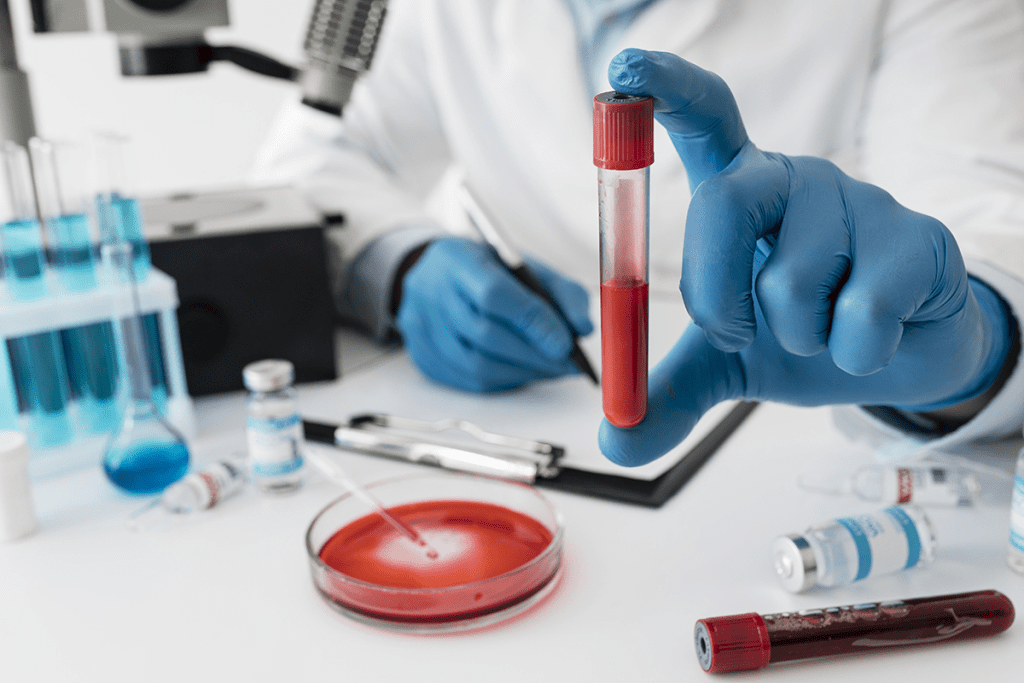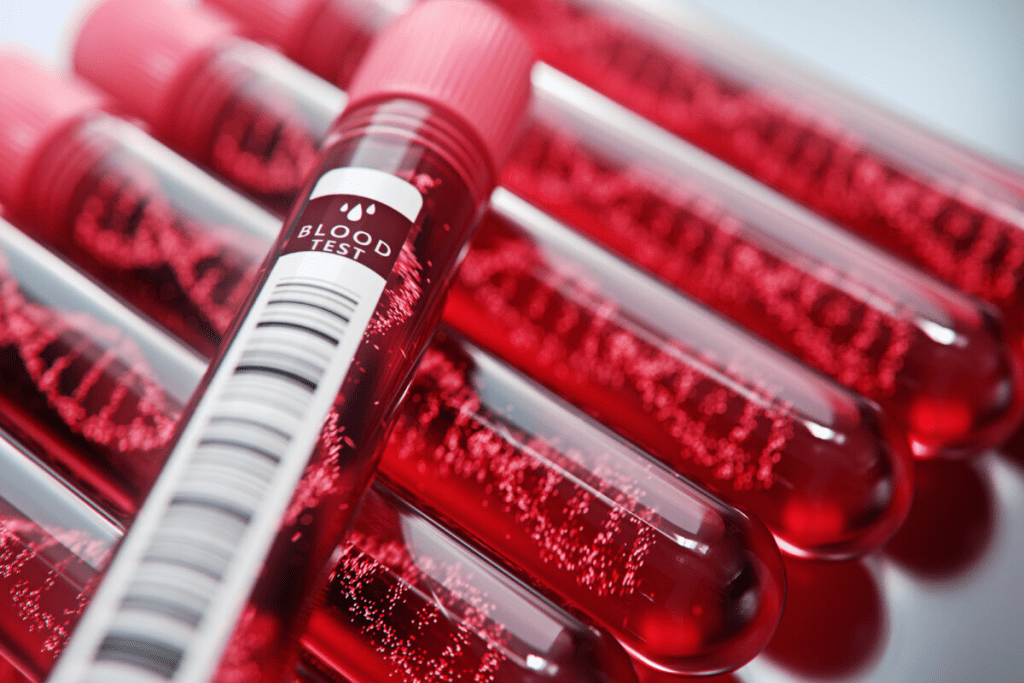Last Updated on October 21, 2025 by mcelik

For many patients, being referred to a hematologist can feel intimidating. Blood disorders affect millions of people worldwide, and understanding what does a hematologist do can ease those worries. A hematologist is key in diagnosing and treating these issues. At your first visit, you’ll get a detailed look at your medical history and a physical check-up.
Being referred to a hematologist can be unsettling. But this visit is a chance to learn about your condition and treatment choices. The hematologist will talk about your symptoms, medical history, and might order tests to find the cause of your condition.

Hematology is a key area in medicine that studies blood and its problems. It looks into the causes, treatments, and ways to prevent blood-related diseases.
Hematology is a part of medicine that studies blood and its disorders. It helps diagnose and treat issues like anemia, bleeding problems, and blood cancers. It’s a complex field that needs a deep understanding of blood and its functions.
Hematology is vital for managing health issues. By studying blood disorders, hematologists can offer specific treatments. This improves patient care for both common and rare conditions.
Hematology covers a wide range in modern medicine. It deals with many blood disorders, from common anemia to complex leukemia.
Hematologists are key in patient care, providing diagnostic and treatment options. The field keeps growing with new medical technologies and research. This leads to better ways to diagnose and treat diseases.
Key areas of focus in hematology include:
Hematologists treat many blood disorders and conditions. These include anemia, bleeding disorders like hemophilia, and blood cancers like lymphoma and leukemia.
Some common blood disorders treated by hematologists are:
Knowing these conditions well is key for effective treatment. Hematologists use various tests to find the cause of symptoms. They then create a treatment plan tailored to each patient.

Hematologists are medical experts who handle many tasks. They interpret tests and create treatment plans for blood disorders. Let’s look at what they do and how they help patients.
Hematologists are skilled in finding blood disorders. They use tests like blood counts and bone marrow biopsies. This helps them spot issues like anemia and blood cancers.
They also specialize in certain areas. For example, pediatric hematology focuses on kids, and hematopathology deals with lab tests for blood diseases.
After finding the problem, hematologists create treatment plans. These plans might include medicines, transfusions, or bone marrow transplants. It all depends on the patient’s condition.
They also manage patient care over time. This means checking how well the treatment is working and making changes if needed. They often work with other doctors to give the best care.
A hematologist’s day is busy. They review test results, interpret data, and do procedures like bone marrow biopsies. They also talk with patients about their diagnosis and treatment options.
They also do research to keep up with new discoveries. This helps them improve care through clinical trials and studies.
Your doctor might send you to a hematologist for many reasons. This includes abnormal blood test results or suspected blood disorders. Knowing why can help you get ready for your visit.
Abnormal blood test results are a common reason for a referral. This can mean low red blood cell count (anemia), high white blood cell count (leukocytosis), or low platelet count (thrombocytopenia). These signs can point to serious health issues that need a specialist’s attention.
Anemia, for example, can be caused by iron or vitamin deficiency, or chronic diseases. A hematologist can find the cause and suggest treatment. An elevated white blood cell count might show an infection, inflammation, or bone marrow disorder, all needing expert care.
Suspected blood disorders are another reason for a referral. This includes sickle cell disease, hemophilia, or lymphoma. Symptoms like frequent infections, easy bruising, or persistent fatigue might suggest these conditions.
A hematologist is skilled in diagnosing and treating these complex conditions. They will do a detailed medical history review and run special tests. This helps confirm the diagnosis and create a treatment plan just for you.
Some chronic conditions need ongoing care from a hematologist. For instance, patients with chronic leukemia or myeloproliferative neoplasms need regular check-ups and treatment changes. Hematologists are trained to manage these conditions, improving your quality of life and outcomes.
People with bleeding or clotting disorders also need specialized care. Hematologists work with patients to manage their conditions, prevent complications, and address any concerns or symptoms.
In summary, referrals to a hematologist are for many reasons. This includes abnormal blood test results, suspected blood disorders, and chronic conditions needing specialist care. Understanding these reasons helps patients prepare for their hematology appointments and the steps to diagnose and treat their conditions.
When you think about getting specialized blood care, you might wonder: do I need a referral to see a hematologist? The answer varies based on your insurance and the healthcare system you’re in.
In many places, you need a referral from your primary care doctor to see a hematologist. This is true for many insurance plans that require referrals for specialist visits. Insurance providers have different rules about referrals, so it’s important to know your plan’s rules.
It’s best to call your insurance company to find out about their referral rules. They can tell you what steps you need to take before seeing a hematologist.
| Insurance Type | Referral Requirement | Additional Notes |
| HMO | Usually required | Check with your primary care physician for a referral. |
| PPO | Often not required | You can self-refer, but check your plan details. |
| Medicare | Varies by plan | Some Medicare plans require referrals for specialists. |
For some, you can see a hematologist without a referral, depending on your insurance. This means you can make an appointment directly without needing a referral from your primary doctor.
Before you self-refer, think about these things:
Knowing about referrals and insurance is key to getting the care you need from a hematologist. Being informed helps you move through the healthcare system better and get the right care.
Your first hematology appointment is a big step in finding out and treating blood disorders. Being ready is very important. To get the most from this visit, you need to gather important info, ask questions, and plan ahead.
Getting all your medical records and documents ready is a key step. This includes:
Having these documents ready will help your hematologist understand your situation better. They can then make better decisions about your care.
Writing down questions to ask your hematologist can make your appointment better. Think about asking about:
Writing down your questions ahead of time helps you remember to ask them.
There are also practical things you can do to make your appointment easier. Think about:
Having someone with you can offer emotional support. They can also help you remember what was discussed.
By preparing well for your first hematology appointment, you can have a better experience. Being ready lets you make the most of your time with your hematologist. It also helps you take a more active role in your care.
Many patients wonder how long their first hematology appointment will last. The time needed can change a lot. This depends on how complex the patient’s condition is and if more tests are needed.
Patients usually spend at least an hour at their first hematology visit. This time is for a detailed look at their medical history, a physical check-up, and talking about their diagnosis and treatment.
The first visit is key to understanding the patient’s health. The hematologist will:
Several things can make a hematology appointment longer. These include:
Knowing these factors helps patients get ready for their appointment. It also helps them understand how long it might take.
Being ready and knowing what to expect makes the most of a hematology appointment. It ensures patients get the care and information they need.
Knowing what happens at your first hematology appointment can make you feel less anxious. The first visit is a detailed check that covers several important steps. Each step is designed to get the information needed about your health.
When you arrive, you’ll start with the check-in. This includes filling out forms and checking your insurance. Our team is here to help you with these steps, making your visit easier.
You might need to show ID and bring any medical records or test results. This info is key for our hematologist to understand your health history and current situation.
Reviewing your medical history is a big part of the first visit. Our hematologist will ask about your symptoms, past illnesses, and current medications. This helps us understand your health and find the cause of your symptoms.
Be ready to share your medical history in detail. This includes any past diagnoses, treatments, and results. This info is important for creating a treatment plan that fits your needs.
The physical exam is a key part of the initial visit. Our hematologist will do a detailed check to look for signs of your condition. They’ll check your lymph nodes, spleen, and liver, and assess your overall health.
During the exam, you might have to do more tests or procedures, like blood pressure checks. These help our hematologist get a full picture of your health.
Hematologists use many tests to find and treat blood disorders. These tests help understand a patient’s blood health. They guide treatment and track how conditions change over time.
A Complete Blood Count (CBC) is a key test for hematologists. It checks red, white blood cells, and platelets. It shows if a patient has anemia, infection, or leukemia.
Abnormal white blood cell counts can show infections or bone marrow issues.
“A CBC gives a big picture of blood health,” , a top hematologist. “It’s often the first test for blood disorders.”
Hematologists also do blood smears to look at blood cells closely. This test finds shape or structure problems in blood cells. It can show certain blood disorders.
They also use special tests to check clotting factors or genetic markers. These tests help find conditions like hemophilia or thrombophilia.
A bone marrow biopsy is a detailed test that takes bone marrow samples. It’s used when a hematologist thinks there’s a bone marrow issue, like leukemia or lymphoma. The test shows bone marrow health, like cancer cells or other problems.
Bone marrow biopsies are key for diagnosing and tracking blood cancers. They help see if treatments are working. Though it’s a big step, it’s a vital tool for hematologists.
Understanding your hematology test results is key to diagnosing and managing blood disorders. These tests give a lot of information about your blood cells. This helps doctors find problems and plan the right treatment.
A key part of these results is the blood count. It includes counts of red, white blood cells, and platelets. Abnormal values can show many conditions, like anemia, infections, or leukemia. For example, low red blood cell count might mean anemia. High white blood cell count could show an infection or inflammation.
It’s important to look at the reference ranges from the lab. Values outside these ranges might need more checking or treatment. Your doctor will talk about what your blood count means and what to do next.
Hematology tests also check how well blood cells work. For example, mean corpuscular volume (MCV) and mean corpuscular hemoglobin (MCH) tell us about red blood cells. These markers help find specific anemias and other red blood cell problems.
Knowing about these markers and their health connection is key to managing blood disorders well.
Sometimes, test results show you need more tests or checks. This could be more blood tests, imaging, or bone marrow biopsies. If your results show a problem, your doctor will talk about what to do next and any more tests.
It’s important to follow your doctor’s advice and ask questions if you’re unsure. Being informed and active about your health helps manage blood disorders better and get the best results.
Knowing what a hematologist does can ease worries about cancer. Hematologists treat blood cancers, but they also handle many other blood issues.
Many patients worry about cancer when they see a hematologist. But, hematologists deal with many blood problems that aren’t cancer.
Hematologists and oncologists often work together, mainly with blood cancers. Hematologists focus on blood disorders like leukemia and lymphoma. Oncologists specialize in cancer and might team up with hematologists for blood cancer care.
Some conditions are treated by both hematologists and oncologists. For blood cancers, a hematologist might lead the care team, working with an oncologist to plan treatment.
Hematologists also treat non-cancerous blood issues. These include:
Here’s a table showing some conditions hematologists treat:
| Condition | Description | Typical Treatment Approach |
| Iron Deficiency Anemia | A condition where the body lacks enough iron to produce adequate red blood cells. | Iron supplements, dietary adjustments |
| Hemophilia A | A genetic disorder that impairs the body’s ability to make blood clots, a process needed to stop bleeding. | Replacement therapy to restore missing clotting factor |
| Deep Vein Thrombosis (DVT) | A condition where a blood clot forms in a vein deep inside the body. | Anticoagulant medication, compression stockings |
Understanding what hematologists treat can help patients see their value. They manage both cancerous and non-cancerous blood disorders.
Treating blood disorders needs a detailed and personal plan. Hematologists use many methods to manage these conditions. Each treatment plan is made just for the patient.
We use several ways to treat blood disorders, including:
Creating a treatment timeline is key for managing expectations and tracking progress. This timeline is based on the patient’s condition, health, and how they react to treatments.
Important factors for a treatment timeline include:
Regular check-ups are vital for tracking the patient’s progress and tweaking the treatment plan. We use clinical checks, lab tests, and patient feedback to see how well the treatment is working.
Adjusting the treatment plan might mean changing medicines, adjusting doses, or trying new therapies. Our aim is to find the best treatment for our patients.
By teaming up with our patients and using different treatments, we can offer effective care for blood disorders. This helps improve patient outcomes.
Going to a hematology appointment can be scary. But knowing what to expect can make you feel better. It’s normal to worry about your diagnosis and treatment.
Many people worry because they think hematologists only deal with cancer. But, hematologists also treat many other blood disorders. Knowing this can help ease your fears.
People often worry about the unknown, fear a bad diagnosis, and anxiety about tests. Talking about these fears can help manage your anxiety.
There are ways to deal with anxiety about hematology appointments. Preparing questions can make you feel more in charge. Having someone you trust with you can also help.
Remember, it’s okay to feel anxious. Asking for help shows you’re strong. “You don’t have to be great to start, but you have to start to be great.” This advice is good for facing any challenge, including medical ones.
Coping Techniques:
Using these strategies and understanding what hematology appointments are about can help. Knowing that hematologists are there to support you can also be reassuring.
Understanding your hematology journey is key. It involves getting diagnosed, choosing treatments, and ongoing care. Knowing what to expect at each step helps patients manage their condition better.
Being informed and prepared lets patients take charge of their care. Hematology support resources are vital. They give patients the tools and guidance they need.
As you move forward, don’t hesitate to ask questions or seek support. Stay updated on your condition and treatment options. With the right care and support, managing blood disorders is possible, and you can maintain a good quality of life.
Hematology is the study of blood disorders. Hematologists are specialists who diagnose, treat, and manage these conditions. They interpret tests, create treatment plans, and care for patients.
You might see a hematologist for abnormal blood tests or suspected blood disorders. Primary care doctors or other specialists may send you for their expertise if needed.
Whether you need a referral depends on your insurance and healthcare system. Sometimes, you can go on your own. Other times, a referral is required.
At your first visit, expect a detailed check-up. The hematologist will look at your medical history, do a physical exam, and might order tests. This helps find the cause of your symptoms.
A first visit can take at least an hour. The time can vary based on tests needed or the complexity of your condition.
Hematologists often order tests like complete blood counts and bone marrow biopsies. These tests help understand and manage blood disorders.
No, seeing a hematologist doesn’t mean you have cancer. They treat many conditions, including non-cancerous ones like anemia or bleeding disorders.
To prepare, gather your medical records and think of questions for the hematologist. Also, arrange for someone to support you during the visit.
Treatments for blood disorders vary by condition and severity. Hematologists use different methods, tailoring the plan to each patient’s needs.
To ease anxiety, address common concerns and misconceptions. Look into coping strategies and support resources available to you.
Hematology Oncology Associates of Fredericksburg. (2025). First Visit to a Hematology Oncologist: What to Expect.
https://hoafredericksburg.com/first-visit-to-a-hematology-oncologist/
This article describes the process of meeting your care team, reviewing medical history, discussing symptoms, ordering initial tests, and planning treatments.
Subscribe to our e-newsletter to stay informed about the latest innovations in the world of health and exclusive offers!